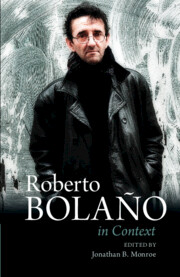Book contents
- Roberto Bolaño in Context
- Roberto Bolaño in Context
- Copyright page
- Contents
- Contributors
- Chronology
- Part I Geographical, Social, and Historical Contexts
- Part II Shaping Events and Literary History
- Part III Genres, Discourses, Media
- Chapter 16 Essays and Short Stories
- Chapter 17 Poetry I: The Ghost That Runs through the Writing
- Chapter 18 Poetry II: Parody and the Question of History
- Chapter 19 The Novel and the Canon
- Chapter 20 Detective Fiction
- Chapter 21 Journalism, Media, Mass Culture
- Chapter 22 Literary Criticism and Literary History
- Part IV Aesthetics, Culture, and Politics
- Further Reading
- Index
Chapter 22 - Literary Criticism and Literary History
from Part III - Genres, Discourses, Media
Published online by Cambridge University Press: 15 December 2022
- Roberto Bolaño in Context
- Roberto Bolaño in Context
- Copyright page
- Contents
- Contributors
- Chronology
- Part I Geographical, Social, and Historical Contexts
- Part II Shaping Events and Literary History
- Part III Genres, Discourses, Media
- Chapter 16 Essays and Short Stories
- Chapter 17 Poetry I: The Ghost That Runs through the Writing
- Chapter 18 Poetry II: Parody and the Question of History
- Chapter 19 The Novel and the Canon
- Chapter 20 Detective Fiction
- Chapter 21 Journalism, Media, Mass Culture
- Chapter 22 Literary Criticism and Literary History
- Part IV Aesthetics, Culture, and Politics
- Further Reading
- Index
Summary
After many years of living the Bohemian life of a poet in Mexico, Roberto Bolaño (1953–2003) moved to Spain and decided to make a living out of literature. Sophie Podolski´s motto, “Writing is a living thing,” was Bolaño´s unique way of approaching literature while practicing literary criticism, rewriting the literary history of Spanish Letters and reconfiguring the Western literary canon in a global world. Soon after the end of the millennium, he became a global literary superstar and the most recognized Latin American contemporary writer. In this chapter, Bolaño´s journey – from an unknown brave poet to a celebrated barbarian novelist – is mapped out through three novellas: Amulet (1999), Distant Star (1996) and Monsieur Pain (1999 [1981–82]). The protagonists of these texts, poets and poetry, show the underlying intense eroticism of power through violence, malice, horror, agony, but also, love, joy, generosity, and tenderness. Making zig-zags, shifts and displacements, the analysis weaves his migrant memories through several geocultural leaps – from Mexico City to Santiago de Chile, and then to Paris – while accentuating the most hideous horrors of a more-than-symbolic modern twentieth century to critique the unfolding of Western civilization through pivotal temporal clusters – the 1960s, 1970s, 1930s–40s.
- Type
- Chapter
- Information
- Roberto Bolaño In Context , pp. 250 - 262Publisher: Cambridge University PressPrint publication year: 2023



